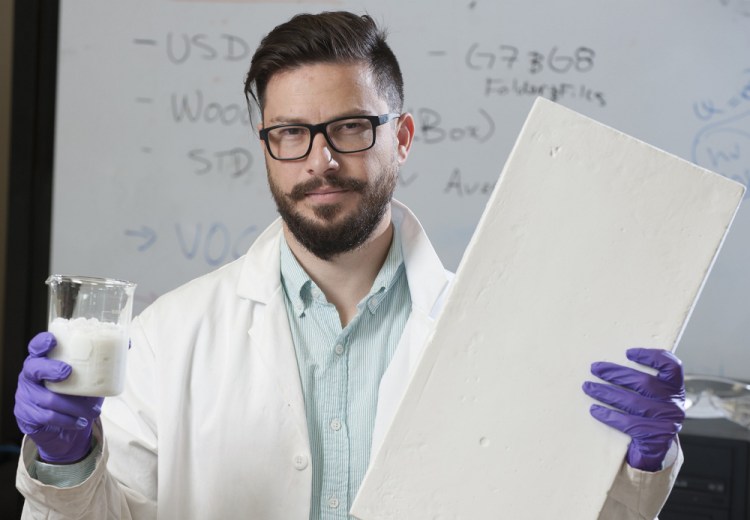President Trump’s efforts to curtail U.S. travel and immigration from seven Muslim-majority countries will only make it harder for states like Maine to foster job-creating innovation and recruit badly needed workers in technology, medicine, hospitality and other fields, business leaders said.
While the temporary ban against travelers from Somalia, Syria, Iraq, Iran, Libya, Sudan and Yemen will not have much direct impact on international job recruitment in Maine, fear and uncertainty about future immigration policy changes will be long-lasting and could further stifle Maine’s economic growth.
“It clearly sends a bad message,” said Ed McKersie, president of Pro Search, who has been in the staffing and recruiting business for 30 years. “It’s worse for us (in Maine) because we need that immigrant population.”
McKersie founded an online platform, Live and Work in Maine, in 2015 to recruit workers to Maine to help fill jobs, especially for employers who need skilled workers.
Maine’s need for science, technology, engineering and mathematics – or STEM – workers is expected to rise sharply in the coming years, according to the state Department of Labor. The number of science- and technology-related jobs is expected to increase at nearly three times the rate for all occupations and account for nearly half of expected net job growth. Maine policymakers expect many of those jobs to be filled by highly skilled foreign workers.
Scientists and entrepreneurs from the Muslim world have made significant contributions to Maine’s economy, including Habib Dagher, who grew up in Lebanon. He joined the faculty of the University of Maine in 1985 and now heads its pioneering Advanced Structures and Composites Center. Entrepreneur Nadir Yildirim is working to help revive the state’s struggling forest products industry through innovation.
Yildirim, who has a Ph.D. in forest resources from the University of Maine, is originally from Turkey. His high-tech startup, Revolution Research Inc., produces fully recyclable foam insulation board made from the molecular building blocks of wood. He sees such products as the future of Maine’s forest industry.
EFFECTS OF TREPIDATION, LESS DIVERSITY
But Yildirim said any government policies that promote fear and inhibit diversity of thought are innovation killers.
“If you increase the fear and decrease the diversity at the same time, you should forget about the big ideas,” he said. “You should forget about inventions, innovations and making money.”
Yildirim said immigrants have been unfairly labeled as job-takers when in fact many are job-creators. He said it takes people from all backgrounds, working hard and respecting each other, to move the country’s economy forward.
“What makes America great is the multicultural system,” Yildirim said. “Here’s what (Apple CEO) Tim Cook says: ‘Apple would not exist without immigration, let alone thrive and innovate the way we do.’ ”
The CEOs of some of the country’s biggest tech firms, including Apple, Google, Facebook and others, have voiced strident opposition to the president’s recent action. The executives said the ban creates extreme uncertainty around the status of some of their best employees. Sundar Pichai, the chief executive at Google, said in a memo to his staff that Trump’s order would prevent at least 187 foreign-born Google employees from entering the U.S., and he ordered staff members who were traveling abroad to return to the country immediately.
Major tech employers in Maine, including Wex Inc. in South Portland and Idexx Laboratories Inc. in Westbrook, said they don’t expect the immigration and travel ban to affect their current hiring and recruiting efforts. Both declined to comment on the broader implications of Trump’s order for businesses.
“While Wex certainly doesn’t discriminate based on anyone’s religious preference, we can’t speak for the business community as a whole,” said Robert Gould, Wex spokesman.
Tae Chong, a longtime advocate for immigrant entrepreneurs in Maine, noted that the state would not have experienced any population growth at all over the past five years if it hadn’t been for immigrants and refugees. Maine is one of only two states in the U.S. where the death rate has surpassed the birth rate.
Chong said it is normal for immigration reform to occur periodically, and that the number of foreign refugees allowed into the U.S. has fluctuated regularly over the past few decades. However, he said the manner in which Trump’s executive order was implemented has created an unprecedented degree of confusion and uncertainty that could damage the economy.
“Instability is the most harmful thing for any business,” Chong said. “Unpredictability is what everyone in the business world fears.”
UNCERTAINTY AND ITS CHILLING EFFECT
Kerem Durdag, entrepreneur in residence at the Maine Technology Institute and former CEO of Maine-based Biovation LLC, said another big problem with Trump’s order is the fact that it appears to be targeting a specific ethnic and religious group.
Durdag, a Muslim who was born in Turkey and grew up in Pakistan, is a naturalized U.S. citizen, but said he sympathizes with the uncertain position of green card holders as a result of the travel ban.
“I have tons of friends who travel to the U.S. on business,” he said. “They’re green card holders, and now they’re all panicking.”
Durdag said it will take a long time for the U.S. to regain the international community’s trust following Trump’s travel ban.
Ryan Wallace, director of the Center for Business and Economic Research at the University of Southern Maine, said the ban’s long-term chilling effect on immigration is the primary concern.
“That’s a big loss, when you’re talking about some of the people who drive innovation and knowledge creation that’s driving economic activity,” Wallace said, adding that immigrants tend to create more new companies than non-immigrants. “Whether or not this ban is going to keep them from coming, I don’t know.”
Steve Hewins, CEO of the Maine Innkeepers and Maine Restaurant associations, said the businesses he represents are concerned that Trump’s administration might take steps in the future to restrict or eliminate work visa programs for foreign citizens on which Maine’s tourism industry relies. About 9 percent of the tourism workforce comes from overseas to take jobs at inns and restaurants throughout the state.
“As President Trump rolls out more comprehensive changes to immigration, we would urge him not to make changes to programs that would limit or reduce the amount of temporary workers entering the country,” Hewins said. “It would be nice if we had Maine citizens to fill (all) these jobs, but unfortunately we do not.”
J. Craig Anderson can be contacted at 791-6390 or at:
Twitter: jcraiganderson
Send questions/comments to the editors.






Comments are no longer available on this story